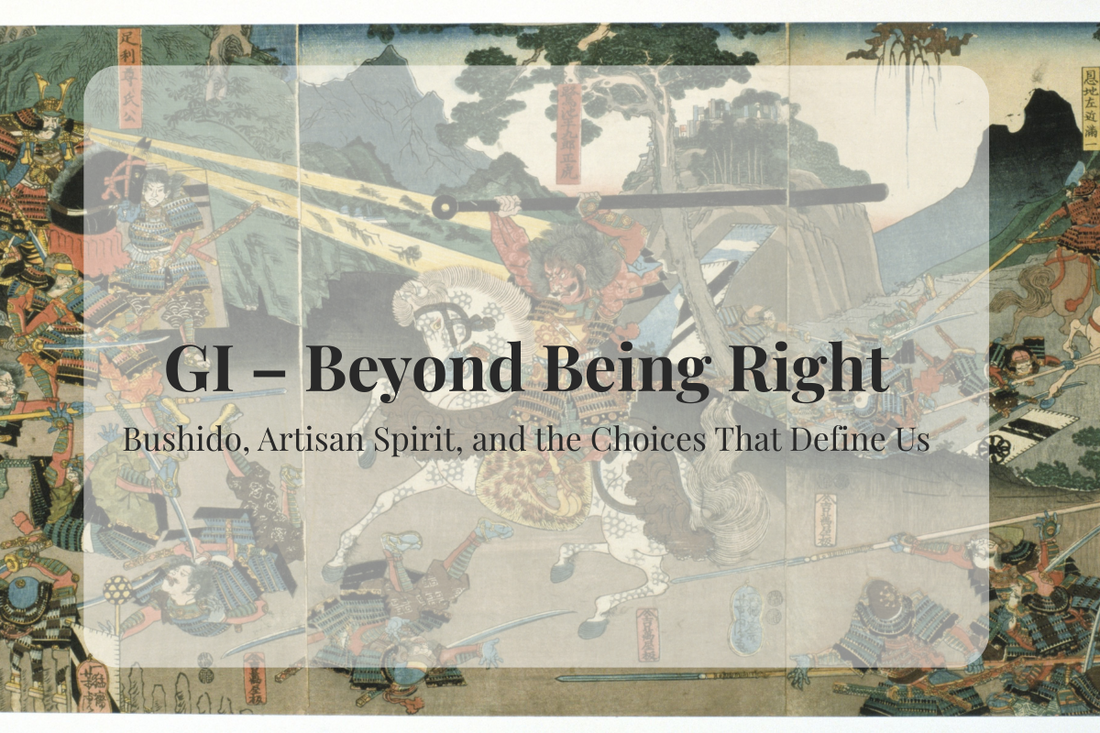
GI – Beyond “Being Right
What Bushido, Artisan Spirit, and Farewell My Concubine Teach Us
When I was a child, my grandfather loved watching jidai-geki—Japanese period dramas.
Samurai slashing down villains, justice prevailing — every story was different, yet the ending was always the same:
the wrongdoer repents and starts a new life.
It was the classic “kanzen-chōaku” (good is rewarded, evil is punished) storytelling.
As a child, I couldn’t understand why my grandfather kept watching when the endings were so predictable.
But now I realize what he was really watching for:
the journey.
The process of seeing how someone makes mistakes, admits them, and rebuilds relationships — that was the true heart of those dramas.
What Does “GI” Mean in Bushido?
In Bushido, GI (義) is often translated as “righteousness,” but it is not the same as the Western idea of Justice or the Chinese concept of law-based social order.
In the West, righteousness often means standing firmly for one’s personal beliefs.
In China, it often means disciplining oneself for the sake of the state or order.
In Japan, GI is relational.
It’s about preserving connections with those in front of you, even at personal cost.
It’s about acting with sincerity and honor beyond positions or personal gain.
Farewell My Concubine — Dignity in Chaos
Recently, I watched the Chinese film Farewell My Concubine.
Set during the turbulent 20th century, it follows Beijing opera actors as they survive war, occupation, and political upheaval.
After World War II, the Chinese Civil War broke out.
When the Communists claimed victory, their soldiers replaced the Japanese in occupying the Beijing opera theater.
These soldiers were crude, violating theater etiquette, even climbing onto the stage and surrounding the terrified actor Cheng Dieyi.
His partner Xiaolou exploded in anger:
“Even the Japanese soldiers never did such a thing!”
Later, Cheng Dieyi stood trial in a Communist court as a “traitor” for performing at a Japanese officer’s banquet.
But his words were striking:
“I hate the Japanese. But they never laid a finger on me. If General Aoki were still alive, he would have taken Peking Opera to Japan.”
Dieyi, a male actor who devoted his life to playing female roles on stage, refused to defend himself.
Instead, he criticized the court and held onto his dignity.
That moment showed me this:
Even in the chaos of war, to restrain oneself and respect others is profoundly noble.
It is, in many ways, the very essence of GI in Bushido.
Artisan Spirit and Bushido
I see that same GI in the artisans I work with.
In nassen (traditional dyeing), even slight differences in temperature, humidity, or fabric tension can change the final color.
In the humid summer and the dry winter, in workshops without modern climate control, they prioritize the furoshiki over their own comfort.
When I asked why they go to such lengths, they said:
“Because it feels wrong not to do it properly.”
It’s not for praise or recognition.
It’s a matter of self-discipline — doing what is right simply because it must be done.
To me, that is deeply moving.
Living in a Complicated World
In today’s world, we can get anything with a single click.
We sell our furoshiki on Amazon too, and I’m grateful for that convenience.
But behind that convenience are people suffering from disasters, wars, and injustices.
One of my recent customers was from Israel.
I sent documents for a cultural furoshiki event — and shortly after, a new conflict broke out.
I worried whether the package would even arrive, while watching the news of Israeli strikes on Palestine and Iran with a heavy heart.
Praying for peace and sharing culture — I carry both of these feelings.
And it makes me think more deeply about what it really means to choose the things we bring into our lives.
What Musubism’s Furoshiki Represents
A Musubism furoshiki is not just a piece of cloth.
It carries the sincerity of artisans, the self-discipline of Bushido, and a wish to connect cultures.
Choosing something is more than just buying it.
It’s about understanding who made it, with what intention, and receiving its value with gratitude.
If that resonates with you, I believe our furoshiki will truly speak to you.
GI, artisan spirit, and human dignity — these are not only at the heart of Japanese culture.
They may also be keys to building mutual respect and understanding in our world today.
